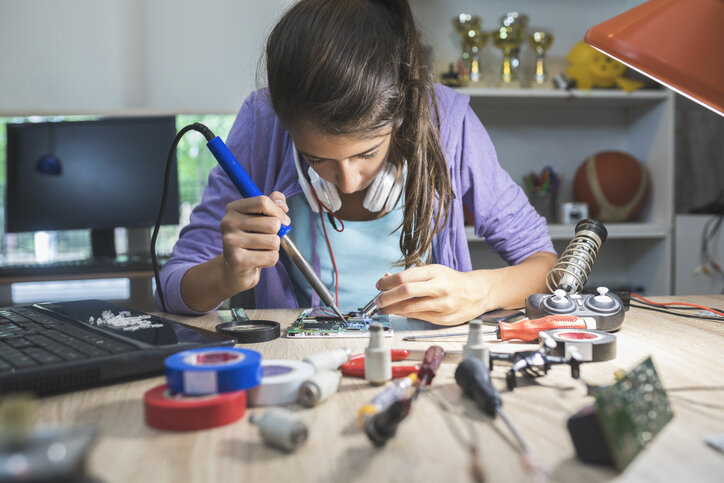Born from scientific curiosity and the desire to make home improvements, do-it-yourself (DIY) science is now a vehicle for acquiring skills.
The practice of do-it-yourself (DIY) science has become especially relevant this past year, either as a necessary online educational practice due to pandemic contingency or a path to create medical solutions to mitigate the impact of this health crisis. To understand this concept, we must first explain the DIY movement.
The term “DIY” refers to making or repairing things on your own. The origin of the trend came from the desire and initiative to learn about home improvement, but it was always linked to scientific curiosity, inventiveness, and innovation.
DIY practice has arguably been one of the most successful vehicles for promoting basic home maintenance skills and self-sufficiency. During the pandemic, it has offered a haven where people can master new activities, feel useful, and maintain their mental health. However, how does the DIY movement impact the scientific community as an educational tool?
Start-ups and DIY scientific exercise
When we speak about DIY science, we talk about projects that start in a garage. These can be a school assignment, a project for fun, or the first attempt to create the Apple computer. These instances have been extended to other fields such as chemistry and biology.
Generally, we have the idea that all scientific production must be carried out by academia. This statement is neither entirely wrong nor correct. The role of academia is crucial to validate scientific efforts and, in some cases, to fund them, but it is not necessary for academicians to produce them in all cases. Many projects start in the participants’ homes and are consolidated through a business model or launched as start-ups.
Such is the case of Mycoworks, a Mexican initiative that works with mycelium cells to make products ranging from imitation leather to bricks. Or Curative, which is dedicated to producing COVID-19 diagnostic tests and creating easy access to vaccines. “It’s exciting to watch just how much DIYbio has taken from tech culture. Tech start-ups, indie game development, and the Silicon Valley «underdog culture» were all born from the computer hacking days of yore,” explains Leigh Nicholson, a Ph.D. candidate in cellular and reproductive biology at the University of Sydney, in an article for weforum.com. She adds that DIY production in biological science remains a small and controversial topic, but much of it has been consolidated in start-ups. While the benefits of technological advances are broad, what are the ethical implications?
The ethics of doing it yourself
DIY science is not a new science. This epistemic trend will not compete with or replace the science performed in academic institutions and universities. It is just a different way of learning and practicing science. One that enhances flexibility, collaboration, transparency, openness, and the desire to share knowledge.
DIY science constantly intersects with open access resources and the philosophy of economic self-sufficiency, which enable entrepreneurship. Through open access and the enablement of autonomy, DIY science has contributed much to the democratization of science. However, the above entails pros and cons. Individuals do not have to go through the same controls and validations as educational and research institutions. While DIY science may provide an agile work pace and perhaps produce new knowledge faster, the path to testing and normalizing that knowledge, making sure it is safe for the general public, is more arduous, especially in the biological sciences sector.
“Policymakers are aware that involving members of the public in the execution of research presents ethical challenges that require attention.” In their paper “A Cohort of Pirate Ships: Biomedical Citizen Scientists’ Attitudes Toward Ethical Oversight,” the authors Meredith Trejo, Isabel Canfield, Whitney Bash Brooks, Alex Pearlman, and Christi Guerrini explain the intention of academic institutions to establish guidelines and regulations that allow safe and efficient scientific practices. The authors add that the National Institutes of Health in the United States (NIH) investigates the ethical, social, and legal implications of independent research and has conducted several workshops on this topic since 2015. Efforts of this nature have helped to promote the ethical supervision of independent biomedical science activities.
While there’s still a debate between those who advocate more explicit ethical policies for DIY science and those who think it would reduce its flexibility and free collaboration, this practice continues to dabble and innovate. Thus, it is more necessary than ever to have this conversation and establish a dialogue among science producers at all levels and institutions. Have you heard of DIY science before? Have you applied it in your classes? What do you think of the ethical implications of practicing science outside of institutions? Let us know in the comments.
Translation by Daniel Wetta.
This article from Observatory of the Institute for the Future of Education may be shared under the terms of the license CC BY-NC-SA 4.0 
)
)


)